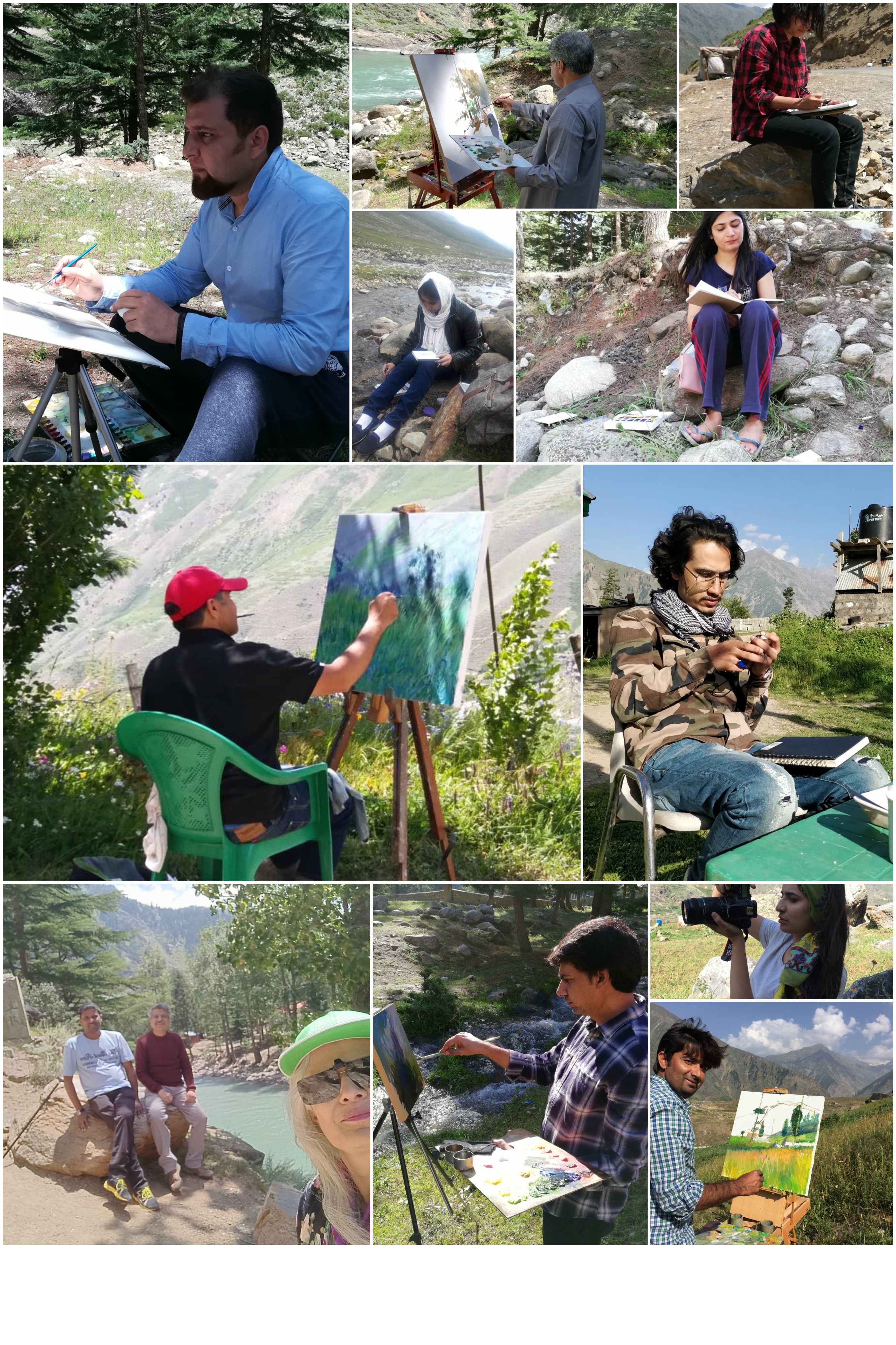Art for Climate Change
Sep 11 2018 | 11:12:57
Report on the Practitioners’ Retreat
2018
Art for social change” is a movement
that is increasingly being used for addressing and challenging social issues.
Socially engaged art can provide a platform for reflection, creating demands
for change and collaboration. It can reach out to a large audience.
To address the issue of climate
change and ancillary aspects like biodiversity loss and eco-degradation, a
consortium of five different Pakistani organizations came together in July 2018
to organize an “Art for Climate Change” retreat in Northern Areas of Pakistan. These
were Civil Society Coalition for Climate Change (CSCCC), Snow Leopard
Foundation, Pakistan Tourism Development Corporation (PTDC), Gallery 6
Islamabad and East-West Center Association-Islamabad Chapter (EWCA-IC). This retreat
was the second edition of a similar event held in 2016 by Gallery 6 and Ministry
of Climate Change.
As in 2016, the purpose of this
retreat was to enhance advocacy and outreach by bringing together artists of
Pakistan to travel and observe places in order to appreciate issues around biodiversity,
climate change, environmental degradation and conservation efforts in northern
Pakistan. This has enabled and facilitated development of products (such as
paintings, photographs, sculptures, documentary, short visual stories) which
would attract media, groups, individuals and all stakeholders to learn about
and explore factors leading to climate change and its resultant negative
impacts. This in turn will lead to critical thinking, new ideas and inspirations,
and hopefully positive actions, for creating and spreading awareness about
these factors and combating their negative effects.
The group was led by Dr. Arjumand
Faisel, Curator of Gallery 6, and brought together (a) 11 artists [Sajid
Ali (Peshawar), Ajab Khan (DI Khan),
Asad Asghar (Mansehra), Muhammad Tariq (Chakwal), Khayyam (Lahore),
Irfan Gul Dahri (Lahore), Abid Khan (Lahore), Muhammad Arshad (Lahore), Kiran
Saleem (Lahore), Fakhra Asif (Lahore)]. (b) Film Maker and Photographers
- Ali Ijaz (Islamabad), Amna Yaseen (Lahore), and (d) journalist Afia salam,
(e) Manager - Asad Ghufran (PhD), Associate Professor of Environmental
Sciences, IIU, Islamabad. Syed Abu Ahmad
Akif (Chairman PTDC), Ms. Ayesha Khan (CEO, CSCCC). Ambassador (retd) Tariq
Zameer, an avid photographer, also joined the group for 3 days.
The places visited by the
participants from 30 July to 08 August 2018included Naran, Batakundi, Lulusar
Lake Gittidas, Babusar Top and Lake Saiful Muluk . On site, the participants
worked on their sketch books, paper sheets, canvases as well as through camera
lenses to create their artworks. They
have brought back these initial inputs and are continuing to work in their
studios. These are expected to be ready by mid-September and will be exhibited
in October.
The expected outputs are paintings
of beautiful landscapes depicting biodiversity, natural environmental
serenity and their vulnerability to disasters AND conceptual paintings with
thought provoking imagery that draws attention to environmental issues. Photographs,
highlighting issues of destructions, degradation and devastations being caused
by humans. A short film on the retreat with visual stories on factors
affecting climate change and effect/damages to environment because of climate
change.
During the retreat, participants
also cleaned two lakes: Lulusar and Saiful Muluk. They collected garbage in
biodegradable bags and cleaned the banks. Local people and tourists alike were
involved in cleaning of the area. Participants actively advocated adoption of
the habit of not spreading garbage and collecting it in degradable bags.
This retreat will be a big step in
Pakistan’s efforts to create awareness about factors leading to climate change
and resultant negative impacts among media personnel, families and individuals
through one or more of the following actions:
(a) an exhibition in October 2018,
(b) Use of social media - participants
and organizers have actively used social media (Facebook, twitter, Instagram)
during retreat days and will also share its “products”,
(c) sharing information nationally
and internationally through media coverage by press, radio and TV channels,
(d) circulating information
describing the art residency and exhibition internationally through Gallery 6
emails and East-West Center newsletter to reflect Pakistan’s awareness and
interest in issues of biodiversity, climate change, degradation and
environmental conservation.
